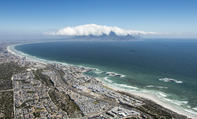Cape of Storms
At first, there was very little European interest in the Cape of Storms. The waters around the headland were turbulent and so were the natives.

Then, in 1503, Antonio da Saldanha accidentally found his way into Table Bay, which he modestly named Saldania, and the Cape began to gain some prominence. Still, even though Table Bay was a useful anchorage, especially if the seas were stormy, it was not a regular stop on the sea route East. In fact, the Portuguese gave the whole South African coast a wide berth and established their refreshment stations along the humid shores of Moçambique.
Anti-Native Sentiment
In 1510, a much-medalled Viceroy and a party of Portuguese noblemen, returning from the East, landed at the Cape. By this time, the local Khoikhoi tribes were getting pretty restless with all the passing ships and, when the crew came ashore to trade for fresh supplies, the Khoikhoi were dismissive and rude.
The distinguished assembly of knobs on board the ship decided that this insult could not be countenanced, and brashly went ashore to teach the savages a lesson in civility. This apparently included stealing cattle and kidnapping some Khoikhoi children to be sold into slavery. The “primitive heathen”, however, met the punitive expedition head on.
Using sticks, stones and their special war-trained cattle, the Cape Khoikhoi soundly defeated the Portuguese, and many well-born officers went down in a stampede of hooves, rocks and fire-hardened wooden spears. The loss was, understandably, a big shock to the European psyche and it added fuel for the glowing fires of anti-Hottentot sentiment.
Sea Legs
Land battles notwithstanding, no-one could challenge the Portuguese in their control of the seas. Portugal was becoming rich and it looked like they would always be the foremost sea-faring nation on the Earth. But everything runs in cycles, and Portugal’s fortunes began to sink as other European nations slowly began to gain their sea legs.
The turn-around started as early as 1522, when Ferdinand Magellan, sailing under the Spanish flag, found the Westward Passage to the Orient. Then, in 1580, Sir Francis Bacon circumnavigated the globe for England. In the same year, Phillip II of Spain assumed the Portuguese throne and took control of the whole Iberian Peninsula.
This, in effect, brought Portugal into a festering war between Spain and Holland. The Dutch and their British allies were consequently freed from any moral obligation to honour Portugal’s monopoly over the trade route to the East.